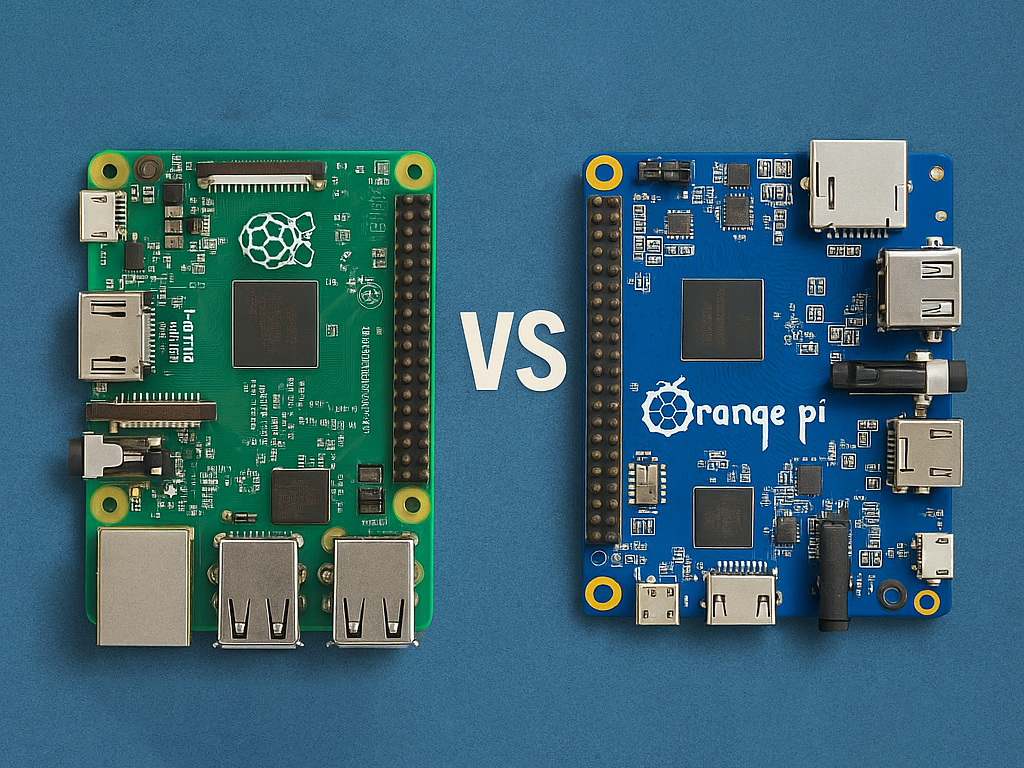Single-board computers (SBCs) have revolutionized how we think about computing, making DIY electronics, automation, and education more accessible than ever. Among the most popular contenders in this space are Raspberry Pi and Orange Pi. But which one should you choose?
Whether you’re building a retro gaming console, a home automation server, or a personal Linux desktop, selecting the right board can make all the difference. Let’s dive into the comparison to help you make an informed decision.
🟩 What Is Raspberry Pi?
Raspberry Pi, developed by the Raspberry Pi Foundation in the UK, is the most recognized name in the SBC world. It’s known for its:
- Wide community support
- Stable software ecosystem
- Excellent documentation
- Perfect fit for educational and hobbyist use
The latest models (like the Raspberry Pi 5) pack enough power to run full Linux desktops, media centers, and even web servers.
🟧 What Is Orange Pi?
Orange Pi, developed by Shenzhen Xunlong Software in China, is a family of boards designed to provide affordable alternatives to the Raspberry Pi. Key advantages include:
- Greater variety of hardware options
- Often better performance at lower price points
- Support for Android, Ubuntu, Debian, and more
Orange Pi boards are popular among tinkerers looking for higher specs or features like SATA ports, eMMC storage, or dual Ethernet.
🔍 Head-to-Head Comparison
| Feature | Raspberry Pi | Orange Pi |
|---|---|---|
| Price | Slightly higher | More budget-friendly |
| Performance | Great, especially Pi 5 | Varies; some models outperform Raspberry Pi |
| Community Support | Massive global community | Smaller but growing |
| OS Support | Raspberry Pi OS + wide Linux support | Android, Ubuntu, Debian, etc. |
| Accessories | Huge range of HATs, cases, displays | Fewer but growing options |
| Ease of Use | Beginner-friendly | Can be complex for newbies |
| Documentation | Excellent official docs + forums | Limited or community-based |
🧠 Use Case Recommendations
- Beginners & Educators: Choose Raspberry Pi. The simplicity, tutorials, and educational focus make it ideal for learning programming, robotics, or Linux.
- Performance-Centric Projects: Choose Orange Pi if you need more CPU/RAM power for media servers, AI edge computing, or IoT gateways.
- Budget Projects: Orange Pi models often offer more bang for your buck, though they might require more setup and troubleshooting.
🏁 Final Verdict
There is no absolute winner. It all comes down to your specific use case, budget, and experience level.
- For reliable, beginner-friendly performance, the Raspberry Pi wins.
- For raw power and affordability, Orange Pi can be a compelling alternative.
If you’re new to SBCs, start with a Raspberry Pi. If you’re comfortable with Linux and hardware configuration, explore Orange Pi to stretch your dollar further.
📌 Bonus Tip
Before buying either board, check:
- Power supply compatibility
- Peripheral requirements (HDMI, USB, GPIO, etc.)
- Available OS images and updates
- Community or vendor support
💬 Have you used both Raspberry Pi and Orange Pi? Share your experience in the comments — we’d love to hear how you use your SBC!
